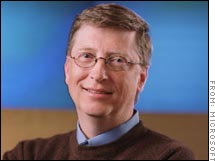|
A kinder, gentler Microsoft
A newly likeable Bill Gates isn't afraid to admit his company is lagging in some areas, says FORTUNE's Adam Lashinsky.
NEW YORK (FORTUNE) - I have a confession to make: I like the new Microsoft. That would be the humble, cuddly, gracious, accepting Microsoft (Research). Okay, maybe that's laying it on too thick, too much like what Microsoft would like you to believe. So, cuddly and gracious? Perhaps not. Humbler? Absolutely.
I'm not the only one who thinks so. At the Wall Street Journal's recent technology gabfest in Carlsbad, California, one executive stole the show: Bill Gates. Imagine an audience of technology executives and known Apple (Research) sympathizers actually applauding a demonstration of new features in an upcoming Microsoft software release. Gates, interviewed in front of hundreds by two Wall Street Journal columnists, also looked good in comparison to the competition. Yahoo's (Research) Terry Semel was on the defensive over his company's China human rights policy. Howard Stringer was enormously entertaining but mum on exactly how he'll return Sony (Research) to greatness. Bob Iger of Disney (Research) was the antithesis of the excitable CEO. Gates, on the other hand, wowed the crowd with humility about where Microsoft is lagging Google (Research), with specifics about where Microsoft is going and even with the admirable reminder of his own heroic efforts to wipe out killer diseases. Could this really be the Microsoft in general and Bill Gates in particular that we've grown to dislike so much over the years? In a word, yes. Let's start with the humility part. Microsoft, still the cash gusher it's always been, knows that it is a laggard in the search business. "This is one where there's more upside than downside," says Gates. He acknowledges that Google is the leader, but suggests outfits like Amazon's A9 search engine and Ask.com have done more innovating. Furthermore, the contest isn't over. "It's a five-year battle, no, maybe not the right word, trek," says Gates. The crowd chuckles. (There's more humility when Gates is asked to discuss his philanthropy: "I don't want to impose my enthusiasm for cholera on this audience.") Gates does little to extinguish rumors that Microsoft's successful Xbox unit will come out with a portable consumer-electronics device. But how, his interviewers ask, will device manufacturers that use Microsoft software feel about that? "Probably the way Sony feels about Xbox," he says. The message: Everyone's a potential customer and competitor. Same as it ever was. There was candor as well. Asked if he'd relinquish his chief software architect title to newcomer Ray Ozzie, Gates responds: "My title is weird. People should think of me as the chairman," his other title. "I'm the chairman." Some see this as an example of Gates's disengagement from Microsoft. I see it as exactly the opposite: 'Never mind my cute, creative, geeky title. I'm still the boss around here,' he seems to be saying. He also informed. Microsoft's hardware partners are now selling 1 million so-called media-center PCs each month. These are computers with TV and DVR qualities, a market Microsoft started that has been exceedingly slow to get going. Gates, who displayed none of his trademark rocking back and forth or sharp-tongued defensiveness during his 90 minutes under the bright lights, suggests this is what happens when Microsoft sticks with a new product for years. The braggadocio of old hasn't disappeared, of course. Gates says the new release of Windows, called Vista, will have a groundbreaking natural user interface. "I dare someone whose operating system doesn't see, listen and handle ink" to compete against us, he says.
Some attendees I talked to said they felt it was like the Bill Gates of old. I actually think it's a new Bill Gates: powerful senior statesman who knows his strengths and, surprisingly, his weaknesses. Or least does a good job of suggesting he knows his weaknesses. At the very least he seemed likeable. And that's a start. |
|

